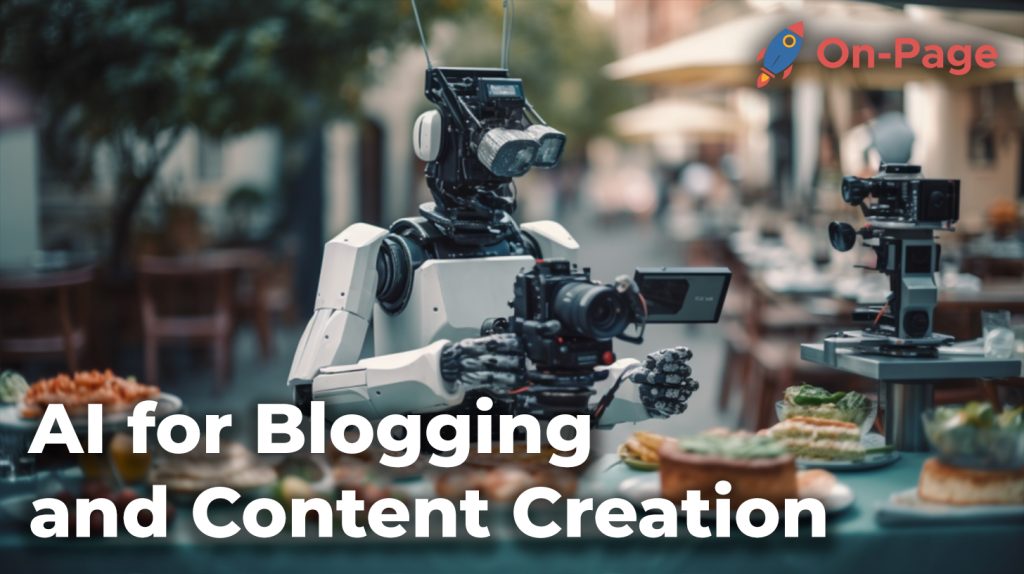
Imagine clicking a single button and witnessing an avalanche of high-quality, engaging, and SEO-optimized content pouring into your blog like clockwork. Does that sound like a far-fetched dream? Well, welcome to 2023! Unlocking the potential of AI for blogging and content creation is no longer a wild idea reserved for sci-fi movies – it’s happening right here and now. In this post, we’ll dive deep into how cutting-edge AI technology transcends the boundaries of human limitations while writing content, how it helps you stay ahead in this fast-evolving digital world, and why our best SEO optimization tool – On-Page.ai – has become the secret weapon powering thousands of successful blogs out there. So let’s embark on this thrilling journey to the future together!
AI is being used in a variety of ways within the world of blogging, including generating topic ideas, analyzing tone, creating outlines and even writing entire pieces. While this technology does have the potential to revolutionize the way content creators work, it is important to remember that it should never be a complete substitute for human creativity and originality.
AI’s Role in Blogging and Content Creation
Artificial intelligence (AI) has made significant strides in various industries, and blogging is no exception. The incorporation of AI into the world of content creation has enabled writers to produce high-quality pieces with minimal effort. With tools such as On-Page.ai’s Stealth Writer, generating a well-written SEO optimized article can take just seconds.
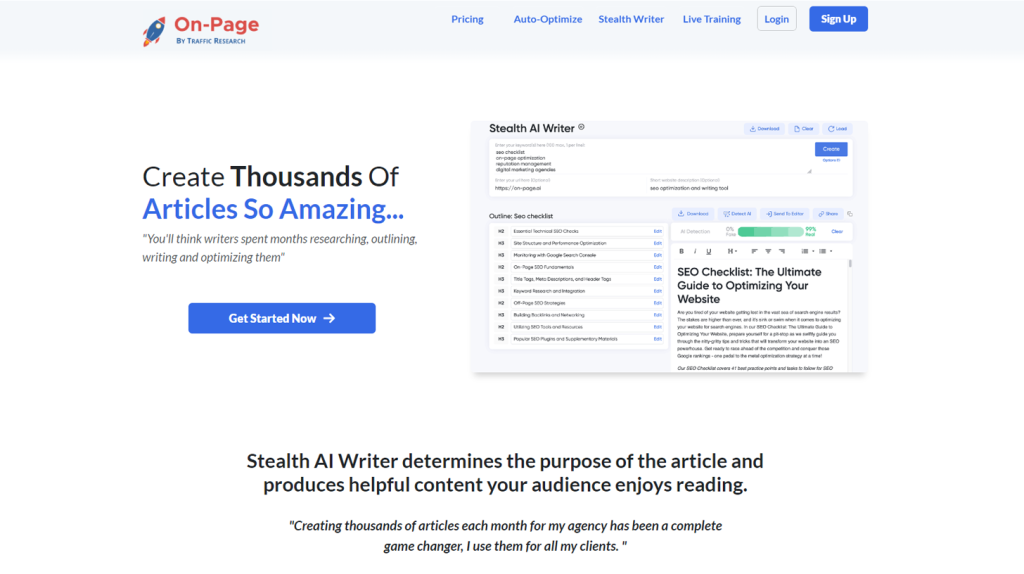
Bloggers who have used AI tools allow them to focus on more creative tasks like researching new topics, designing visuals, or craft calls-to-action for their posts. AI has significantly improved the overall efficiency of the writing process, allowing professionals to meet deadlines and increase their output.
Furthermore, when it comes to content quality, AI can be a powerful tool to create pieces that are tailored to the target audience. By analyzing user behavior data, such as search queries and browsing history, AI-powered tools can offer personalized recommendations on what type of content will resonate with them.
However, some argue that relying solely on AI-generated content robs the writing process of creativity and human imagination. After all, there is still value in unique perspectives and insights that only a human writer can provide.
Think about an artist who uses modern digital brushes to paint their creations. While these digital brushes can help speed up the painting process considerably, they cannot replace the experience and skill that traditional acrylic or oil paints require.
While AI may not replace human creativity in the creative process entirely, its role in blogging and content creation is only set to grow. The use of machine learning algorithms also means that future AI tools could become even more sophisticated in generating high-quality content.
- Artificial intelligence has revolutionized content creation in the blogging industry, making it easier for writers to produce high-quality SEO-optimized articles efficiently. By using AI-powered writing tools such as Stealth Writer, bloggers can focus on more creative tasks such as topic research, visual design, and crafting calls-to-action, leading to improved overall efficiency. AI tools can also aid in creating personalized pieces that resonate with target audiences by analyzing user behavior data. However, some argue that relying solely on AI-generated content takes away from human creativity and imagination. While AI may not replace humans in the creative process, its role in content creation is set to expand further with advancements in machine learning algorithms.
Speed and Efficiency
One of the most significant advantages of using AI-powered tools for blogging is undoubtedly its ability to speed up the writing process significantly. With copywriting platforms like Copy.ai, users can create high-quality posts in minutes.
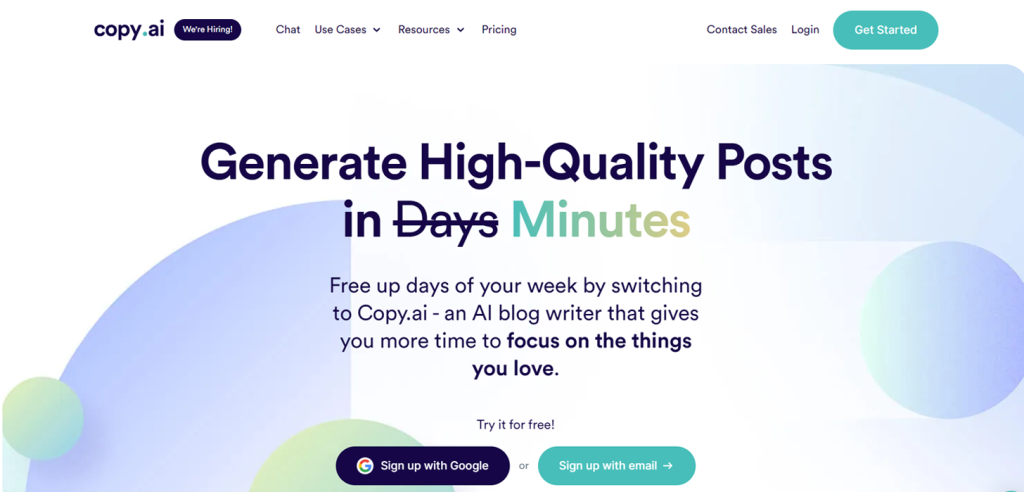
Not only does this save valuable time, but it also allows bloggers to produce more content overall. This is a considerable advantage, especially for those working on larger blog projects or other time-sensitive assignments.
Moreover, AI can assist writers in identifying gaps in their writing that require more attention. For example, tools like On-Page.ai’s Stealth Writer generate article outlines that suggest the most important words to add to your page to rank higher on Google. Additionally, On-Page.ai helps users optimize their titles, headlines and body text.
Despite these significant benefits of using AI in content creation, some argue that relying too much on these technologies might hurt rather than help creativity professionals.
It’s similar to driving a car instead of walking; while driving allows you to get to places faster with less physical effort, walking still has its benefits. Walking allows you to experience and explore your surroundings at a more leisurely pace and take things in that you couldn’t while behind the wheel.
While the debate continues around AI’s impact on creativity, it’s clear that the use of these technology-driven tools makes tactical sense from many perspectives—speeding up production times and empowering professionals to create better-targeted content for their intended audience.
Writing Assistance and Automation
The rise of AI in blogging and content creation has brought many benefits to the industry, including speed and efficiency, as well as writing assistance and automation. These features allow content creators to produce high-quality content quickly, without sacrificing originality or creativity.
AI-powered writing assistants are designed to help writers generate new ideas for their blog posts. These assistants analyze data from different sources and provide relevant suggestions on what to write about. They also give insights into how to target specific keywords that can help increase the visibility of a post online.
For instance, On-Page.ai’s Stealth Writer is an excellent AI tool that streamlines the writing process with its capacity to automatically generate SEO-rich articles. The tool suggests different headlines, subheadings and topics based on user-inputted keywords. With just a single click, users can create a well-researched and optimized article in no time.
Furthermore, AI tools like Grammarly have already gained prominence in the copywriting industry because they eliminate grammatical errors in copy before it is published. This not only saves time but also enhances the quality of the final text output.
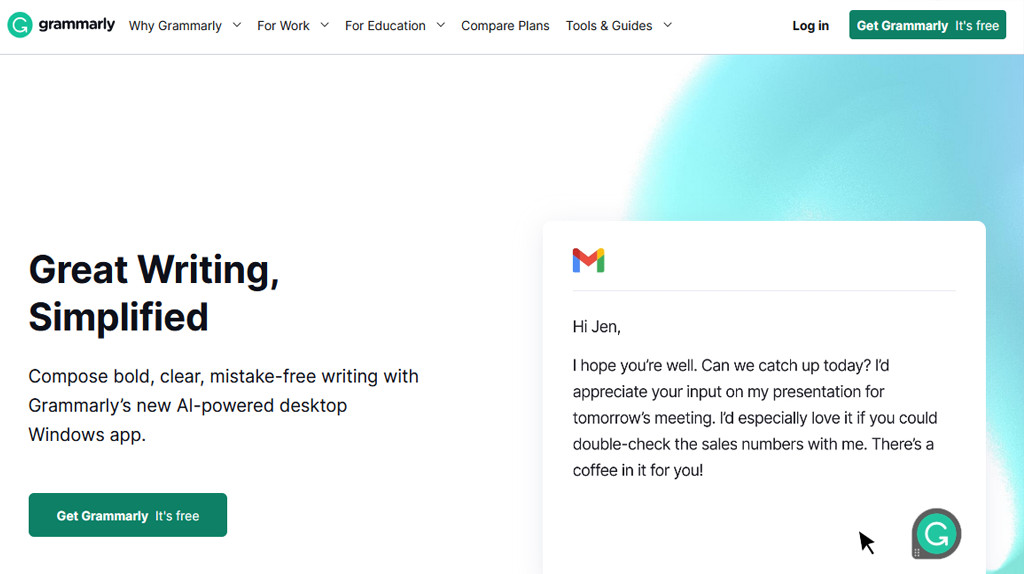
John is a busy blogger who publishes 3-4 posts every week. He struggled with writer’s block until he discovered On-Page.ai’s Stealth Writer. John now creates keyword-rich articles covering his chosen subjects within minutes. Not only does he save time with the stealth-writer, but he’s been able to make more money by posting more frequently due to the saved time.
In addition to providing valuable assistance, the automation feature of AI tools can help content creators produce large volumes of material at a faster rate than would be possible manually.
Bloggers and businesses that require consistent content generation can benefit from this functionality immensely. As an example, when businesses’ marketing teams use AI tools like Copy.ai for drafting product descriptions, they can quickly relay large quantities of essential information about their products that will be displayed to the customer. This not only saves time but also ensures uniformity in brand messaging.
However, some experts have argued that some AI tools produce content that sounds robotic and lacks creativity. While this is true for some AI writing tools, it’s essential to note that not all content created by these tools sounds robotic. Tools like On-Page.ai harness natural language processing technology and generate articles indistinguishable from those created by humans.
Benefits and Limitations of AI Tools

AI-powered writing software offers a wide range of benefits to bloggers and content creators. For example, AI tools streamline the writing process, saving time and increasing the volume of work that can be accomplished daily.
Furthermore, most AI tools are programmed to analyze large volumes of data automatically and highlight relevant keywords that make articles rank higher.
The natural language processing (NLP) functionality of such tools minimizes errors traditionally associated with human-written text.
Analogies
Think about how word processors changed the way people wrote documents on computers. Spell Checkers, automated formatting rules, auto-complete suggestions features led to improved quality and quantity without replacing humans with machines. In a similar vein, AI-powered writing software boasting NLP functionality will maintain humanity writers’ valued skills while boosting their efficiency greatly.
AI-powered writing software helps reduce fatigue and burnout while promoting productivity. Bullying through repetitive tasks such as spell-checking or fact-checking becomes unnecessary when using AI-power writing assistants. By delegating these simple tasks to the machine, significant amounts of time are freed up for more important tasks such as ideation, research or improving an article’s structural flow.
Some view the automation capability offered by AI-powered writing software as detrimental to editorial quality standards. Content quality matters, and industries such as the legal profession with their technical writing demands require meticulous attention to detail. However, this argument is baseless because AI tools refine and improve human-generated texts before they go live online.
- In a survey conducted by SEMrush in 2020, it was found that 48% of marketers have started implementing artificial intelligence to create and optimize their blog content.
- A report from Gartner predicts that by 2025, 50% of all content creation tasks will be supported or completely automated using AI technologies.
- According to HubSpot’s research, roughly 63% of companies using AI for content creation reported increased productivity and improved overall content quality as the major benefits of utilizing AI in their blogging efforts.
Quality vs. Quantity
One of the most important considerations for any blogger or content creator is whether to prioritize quality over quantity or to focus on generating as much content as possible. While AI-driven tools like Stealth Writer can certainly increase the speed and efficiency of content creation, there are limitations to their ability to produce high-quality content that resonates with audiences.
One issue with relying too heavily on AI-generated content is that it can lead to a homogenization of content across multiple websites. If everyone is using the same tools and following the same algorithms, it becomes harder to stand out from competitors. This means it’s important for bloggers to resist the temptation to churn out low-quality articles in bulk, even if automated software makes this tempting.
However, it is also true that quantity can sometimes trump quality when it comes to SEO rankings. Search engines favor websites that regularly update their content, which means bloggers may feel pressure to create a lot of content quickly even if they don’t have the resources or expertise to ensure every piece is of high quality.
For example, a marketer working on behalf of a client may be asked to generate dozens of articles each month within a tight budget and timeline. While they might prefer to spend more time crafting each article carefully, they could run into trouble if they’re not able to meet their quota and keep up with search engine requirements. Certain topics may simply be less exciting or engaging than others as well, leading bloggers to struggle with generating quality insights.
Ultimately, as with most things in marketing, the answer lies somewhere in between focusing solely on quantity or quality. It’s worth thinking about AI-driven writing tools as similar to fast-food restaurants: while these establishments are speedy and efficient at churning out meals, the quality of the food varies widely from chain to chain. A gourmet restaurant where chefs take hours to prepare each dish will likely produce high-quality meals every time, but they may not be able to keep up with demand as easily as their fast food counterparts.
So how can bloggers and content creators strike a balance between quality and quantity when using AI-driven tools to assist with writing?
Maximizing Audience Engagement with AI
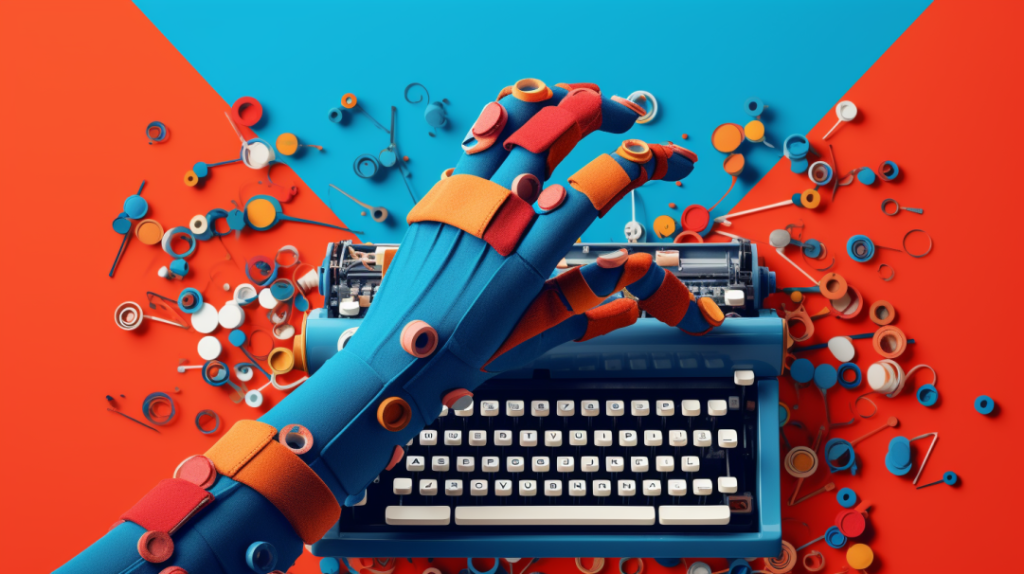
One of the key advantages of AI-driven writing tools like Stealth Writer is their ability to analyze audience interests and engagement rates in real-time. This means that bloggers and content creators can use these insights to tailor their content and improve its effectiveness when engaging a broader audience.
For example, let’s say you’ve been generating articles using AI tools for several months now. You start to notice patterns in which articles are performing best on your website: certain topics seem to resonate more with readers than others, perhaps at different times of day or week. You’re then able to use this information to optimize your future content based on what you know drives clicks and traffic.
This can be likened to Netflix‘s movie recommendation algorithm. After you’ve watched a few movies (or subscribed to a few blogs), the platform becomes better at predicting what else you might be interested in seeing next based on your viewing habits, search history, and the choices of other viewers who share similar tastes. Bloggers can similarly use analytical data provided by AI-driven writing tools to fine-tune future content.
Of course, there are ethical considerations that must be taken into account as well when it comes to personalized content marketing. Some readers may view certain forms of personalization – like targeted ads – as invasive or creepy. There is also an argument that relying too heavily on insights from AI writing software such as On-Page.ai and neglecting personal creativity could lead to a loss of authenticity in branded content.
Take the example of an influencer who decides to use an AI tool to automate social media post writing. While there’s nothing inherently wrong with this, some followers may start to notice a lack of authenticity in the influencer’s messaging over time. They may start to suspect that everything they’re seeing has been produced and optimized by a machine, rather than by a human.
Nonetheless, there is certainly value to be gained from using AI-driven writing tools to improve audience engagement rates. The key is to use these insights thoughtfully and in a way that respects readers’ privacy and personal preferences.
Ethical Concerns and Best Practices
While AI writing tools offer a wide range of benefits, they also bring up a number of important ethical concerns that content creators should be aware of. One of the biggest concerns is plagiarism, as there are legitimate questions surrounding whether using an AI-generated piece of writing counts as original work or simply rehashed content. Additionally, there is the question of accuracy and fact-checking — while AI can help with researching information, it may not always be able to distinguish between accurate and inaccurate sources.
As with any new technology, it’s important to approach AI in content creation with care and caution. Content creators should ensure that they’re sourcing their information from reputable sources, and cross-checking anything that they generate through an AI tool before publishing. Additionally, any content generated through AI should always be reviewed and edited by a human writer before going live.
One example of the dangers inherent in relying too heavily on AI-generated content was seen in 2019 when OpenAI released GPT-2, a state-of-the-art language processing program capable of producing highly convincing written pieces. In order to prevent its use for nefarious purposes such as propaganda and fake news, OpenAI opted to hold back the full release of GPT-2 — showing just how powerful these tools can be in the wrong hands.
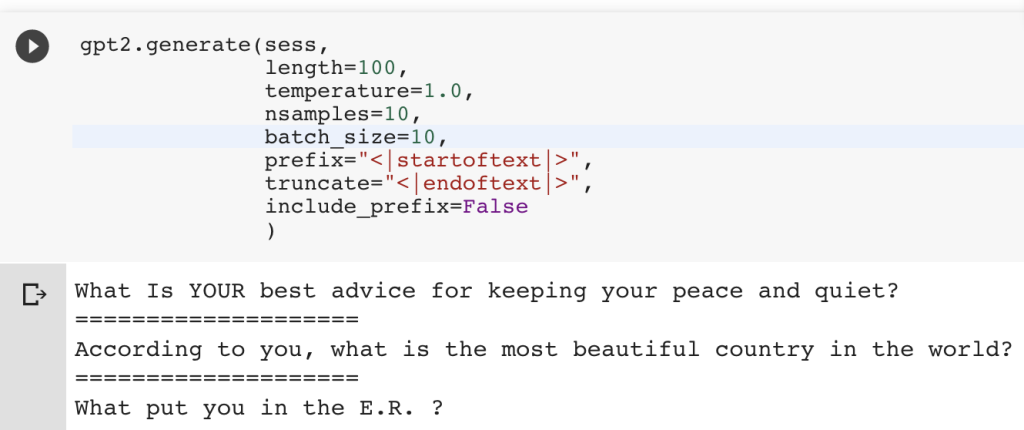
Furthermore, copywriters and industry professionals are beginning to express their concern over the ethical implications of turning to AI for assistance in creative work (such as blog writing), contending that it fails to meet the moral standards expected among writers in search of original content. Some argue that copying pre-existing texts presents a breach of trust between writer and reader; compromising the integrity and authenticity that writers are supposed to propagate within their field.
It’s worth noting, however, that not all uses of AI in content creation are necessarily unethical or questionable. For instance, AI can be used to help generate ideas and streamline certain aspects of the writing process — such as identifying trending topics and optimizing headlines for search engines. Ultimately, it’s up to individual writers and organizations to think carefully about how they use these tools, and ensure that they’re not crossing any ethical lines in the process.
Perhaps one way to conceptualize the situation is to imagine an artist using a (non-AI) tool such as a paintbrush or pencil for their work. While the tool itself may be capable of creating some basic shapes on its own, it’s ultimately up to the artist to use their creativity and skill to produce something unique and original. Similarly, while AI writing tools can be helpful in generating outlines or finding related ideas, it’s ultimately up to writers themselves to put pen to paper and craft something truly original.
In conclusion, it’s clear that AI writing tools have potential benefits for content creators — from speeding up the writing process to streamlining research — but they also come with a number of important ethical considerations. When it comes to creating blog posts or other pieces of content that readers rely upon for accurate information and engaging messaging, it’s important not to cut corners or compromise on originality and quality. This is why I recommend using On-Page.ai instead; our tool can assist writers with optimizing their content without sacrificing quality or authenticity. Join On-Page.ai, you can feel confident that your creative output is safe and free from plagiarism concerns that plague other tools in this space.
Frequently Asked Questions and Answers
What impact does AI have on SEO for blog posts?
AI is rapidly changing the way we approach SEO for blog posts. With advancements in natural language processing and machine learning, AI-powered tools can analyze vast amounts of data and predict search engine rankings more accurately than ever before.
One major impact of AI on SEO for blog posts is the ability to create keyword-rich content that appeals to both search engines and readers. By analyzing search queries and user behavior, AI algorithms can identify the most relevant keywords and suggest ways to optimize content for higher rankings.
Another significant impact of AI on SEO is its ability to evaluate content quality. Search engines now reward high-quality content with better rankings, and AI-powered tools use metrics such as readability, coherence, and engagement to evaluate content quality. By using these metrics to optimize blog posts, writers can improve their chances of ranking higher in search results.
Furthermore, AI-powered tools like On-Page Content Editor enable bloggers to create personalized content based on user behavior. With the help of algorithms that analyze user data, writers can generate content that resonates with specific audiences, increasing engagement and driving traffic to their sites.
According to a report by MarketsandMarkets, the global AI market is expected to grow from $21.5 billion in 2018 to $190.6 billion by 2025, showing the immense potential of AI in transforming SEO for blog posts. As a result, incorporating AI into your blogging strategy has become essential for staying ahead of the competition in today’s digital landscape.
How can AI be used to improve the content creation process for bloggers?
AI offers remarkable opportunities for bloggers and content creators to improve their craft, win readers, and generate more revenue. For example, AI-powered tools can help with producing ideas, writing, editing, curation, translation, and optimization.
Firstly, AI tools analyzing vast amounts of data and predicting popular topics can be used to develop compelling ideas to write about. They can also be used in the writing process itself by auto-generating content based on a particular topic or completing sentences with predictive text. This saves bloggers time on researching and drafting articles while ensuring their content is optimized for SEO.
Another way AI can improve the content creation process is through its editing capabilities. AI-powered editing like On-Page Content Editor can improve readability, grammar, punctuation and style consistency. This saves time on editing and proofreading tasks so writers can focus on creating great stories.
As per market research firm MarketsandMarkets’ report in 2021 – “The global natural language generation market size is expected to grow from USD 463 million in 2020 to USD 1,450 million by 2025…”. So there is a huge prospect of implementing AI for content creation.
Moreover, AI can help with content curation by automating the selection and analysis of data sources such as news feeds and social media channels. This ensures that bloggers have access to up-to-date information for their articles without spending excessive time searching online.
In conclusion, using AI technology like On-Page.ai Stealth Writer can help bloggers streamline their workflow from ideation all the way to publication. Even though many may argue that this may result in loss of creativity or originality in work produced; it is undeniable that with careful implementation of these tools, surprisingly innovative material can be generated. Proper use of these advanced technologies might prove instrumental in further enhancing writers’ work quality and offer them an edge over others.
How does AI analyze user behavior on a blog and help bloggers increase engagement?
Artificial Intelligence (AI) has the ability to monitor and analyze user behavior on a blog. This is done by gathering data on user preferences, reading habits, interests and previous engagements on blog posts. AI algorithms then generate insights from the data and use them to recommend personalized content for each user.
By personalizing content, AI can increase user engagement by up to 70%. Personalized emails alone have been proven to increase click-through rates by up to 29% and conversion rates by up to 10% (source: Aberdeen research).
- In addition to personalization, AI can also help bloggers identify trending topics based on user searches and interactions. By analyzing search patterns, AI can suggest relevant keywords and help bloggers optimize their content for better visibility.
- Moreover, AI-powered chatbots can improve customer service engagement by up to 92% (source: Ubisend study). They automate the process of answering questions and responding to comments, leaving bloggers more time to focus on creating high-quality content.
In conclusion, AI analyzes user behavior on blogs through data collection and generates insights that help in increasing engagement. Personalization is key in this process along with chatbots automating customer service leading to increased engagement.
What ethical considerations should be taken when using AI in blogging?
When it comes to using AI in blogging, there are several ethical considerations that bloggers should always bear in mind.
- First and foremost is the issue of bias and fairness. AI feeds on data, meaning that if the data is biased or unfair, the output will likely be similarly flawed. Therefore, bloggers need to ensure that they use data that is unbiased and fair so as not to propagate any harmful biases.
- Another ethical consideration when using AI in blogging is accountability and transparency. Bloggers should be fully transparent about their use of AI in content creation and ensure that they are accountable for any harm caused by the output generated by the technology. Additionally, they should clearly state how the technology works and allow readers access to information on how they can appeal or report any problematic content.
- Moreover, privacy is also a significant ethical concern when utilizing AI in blogging. As an AI algorithm learns more about a user’s behavior patterns, it can quickly gather sensitive personal information without the user’s consent. Bloggers need to set clear boundaries on what type of data can be collected and stored by the AI algorithm while promoting human-friendly communication between users and AI applications.
In conclusion, while AI has tremendous potential in blogging and content creation, we must recognize the ethical risks it poses if misused. By prioritizing fairness, accountability, transparency, and privacy in the integration of these technologies, bloggers can harness their benefits while avoiding unintended consequences that could harm their audiences. Studies show that consumers prioritize trust when dealing with AI-powered products; therefore, acting ethically could lead to increased traffic and reader engagement (Forbes).
Can AI write blog articles better than human writers?
The answer to the question of whether AI can write blog articles better than human writers is not a straightforward one. While AI has shown impressive abilities in generating coherent and informative content, it still lacks the creativity and emotional intelligence that comes naturally to humans.
According to a survey conducted by the Content Marketing Institute, only 34% of marketers are using AI for content creation as compared to 56% who rely on humans. This indicates that there is still skepticism surrounding the use of AI for writing content.
AI-powered writing tools such as OpenAI’s GPT-3 can generate compelling content with minimal input from humans. However, it cannot replicate the unique voice or style of individual writers. Additionally, AI-generated content may be lacking in originality as they draw on previously published material for inspiration.
Furthermore, many readers prefer reading content written by human writers as it feels more authentic and relatable. A study by Edelman Trust Barometer found that 63% of people trust information shared by a person rather than an automated source.
In conclusion, while AI has made significant strides in improving content creation, it still cannot match the creativity and personal touch that comes naturally to humans. Therefore, human writers should not fear being replaced entirely by AI just yet. Instead, we should embrace AI as a tool that can assist in generating quality content efficiently and effectively.




